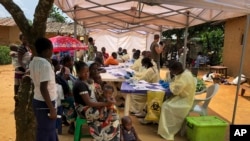The U.N. World Food Program says it plans to double food rations to assist 440,000 people affected by the Ebola virus and their contacts over the next six months to respond to escalating needs in eastern Democratic Republic of Congo.
The dramatic scale-up of food assistance is aimed at providing essential nutritional support to thousands of people affected by the Ebola virus. Recipients will receive food for 28 days. This is one week longer than the 21-day incubation period, the time interval from infection with the virus to onset of symptoms.
The World Food Program says the operation also will allow agencies working to contain the deadly virus to keep tabs on the health situation of contacts of victims and their families, as well as of confirmed and suspected cases.
WFP spokesman Herve Verhoosel explains beneficiaries of this expanded program will be required to come to specific distribution sites every week to pick up their food rations.
“That help us and that help WHO and the Government to have those people coming to the health centers where they receive the food." he said. "And, when they receive the food the health team can make the medical check needed in that 21 days period.”
Verhoosel says people who have been infected by the Ebola virus and who have recovered, will receive food rations for one year.
The WFP spokesman says the operation is running into some problems of acceptance because of community mistrust. He says people affected by Ebola often are stigmatized by their neighbors and some beneficiaries have been threatened because they are seen as posing risks to the community.
To encourage community cooperation, he says WFP is planning to quadruple the number of primary schools in Ebola-affected areas that will receive nutritious hot lunches. He says chronic malnutrition is rife in this area, and for many children this is the main or only meal of the day. He says the number of children slated to receive school meals will rise from 17,000 to 70,000.
Verhoosel says WFP urgently needs $50 million over the next six months to carry out its operation in conflict-ridden North Kivu and Ituri provinces, as well as in neighboring Uganda, Rwanda, Burundi and South Sudan.




